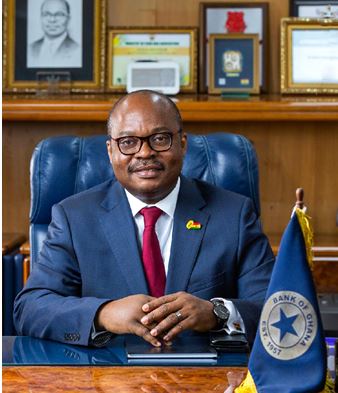By Joshua Worlasi AMLANU
Dr. Ernest Addison, Bank of Ghana Governor, has expressed confidence in the Bank’s improved capacity to protect the economy from external shocks and maintain stability in the foreign exchange market.
This optimism stems from a favourable external position and robust reserve build-up in the first half of 2024.
In a recent press briefing following the 119th Monetary Policy Committee (MPC) meeting, where the committee decided to maintain its policy rate at 29 percent for a third consecutive time, Governor Addison highlighted significant improvements in Ghana’s external payments position – attributing this to a combination of factors.
“The current account surplus significantly improved, aided by strong gold exports, robust remittances and the effect of debt suspension,” Dr. Addison stated.
He also noted the Domestic Gold Purchase Programme’s positive impact in accelerating reserve accumulation beyond initial projections under the IMF-supported programme.
Ghana’s trade balance saw notable enhancement in the first half of 2024 with a surplus of US$1.81billion, up from US$1.60billion for the same period of 2023. This improvement was driven by a substantial increase in exports, particularly in the gold and crude oil sectors. Gold exports surged by 46.4 percent to US$5.04billion, while crude oil exports rose to US$2billion from US$1.7billion the previous year.
However, the cocoa sector experienced a downturn with exports of beans and products declining by 47.4 percent to US$760million, compared to US$1.45billion in the first half of 2023. The total import bill increased by 13.5 percent to US$7.42billion, with both oil and non-oil imports contributing to this rise.
The current account balance showed remarkable improvement, recording a surplus of US$1.28billion in first-half 2024 – up from US$863million for the same period of 2023. This positive trend was supported by the improved trade surplus and higher remittance flows.
The capital and financial account saw a reduction in net outflows, dropping from US$1.04billion for 2023 to US$367.5million in 2024. This decrease was attributed to higher government loan disbursements, reduced amortisations and significantly lower portfolio outflows.
These developments culminated in an overall balance of payments surplus of US$942.3million in first-half 2024, a stark contrast to the deficit of US$341million recorded for the same period of 2023.
The Governor also reported a significant build-up in international reserves during the first six months of 2024. Gross International Reserves increased by US$947million to US$6.87billion, equivalent to 3.1 months of import cover. Net International Reserves saw an even more substantial increase of US$1.31billion, reaching US$4.50billion by end-June 2024.
Despite these positive developments, the Ghanaian cedi faced some pressure in the first half of the year – particularly in May 2024. Dr. Addison however noted that the situation has since eased, citing several contributing factors.
“Relative stability on the foreign exchange market in the past few weeks reflects the continued tight monetary policy stance – implementation of the dynamic Cash Reserve Ratio to mop excess liquidity, revised regulations on advanced payments for imports by the Bank, positive sentiments from the third tranche of the IMF Extended Credit Facility and agreement in principle with external creditors,” he said.
As of July 19, 2024 the Ghana cedi had depreciated by 19.6 percent against the US Dollar since beginning of the year, showing a slight improvement compared to a 22.1 percent depreciation observed in the same period of the previous year.
With these developments the Bank of Ghana appears well-positioned to navigate potential external economic challenges, providing a stabilising influence on the nation’s economy and currency.










